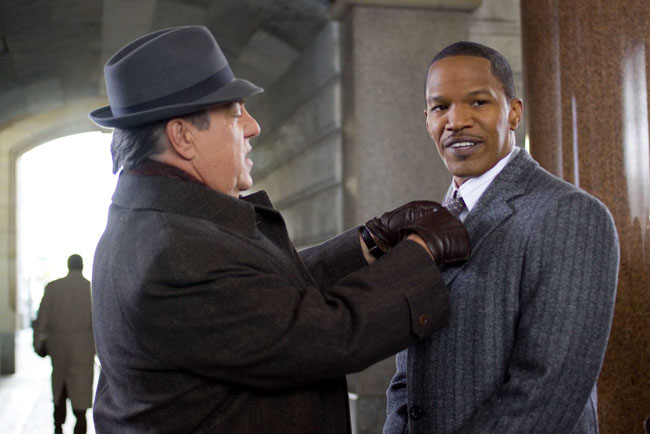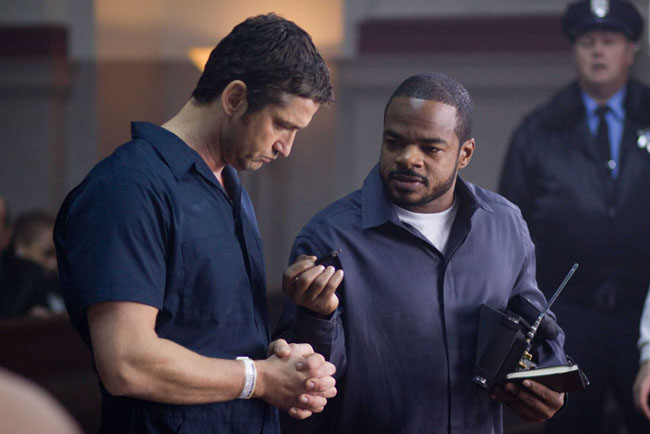CHICAGO – Excelsior! Comic book legend Stan Lee’s famous exclamation puts a fine point on the third and final play of Mark Pracht’s FOUR COLOR TRILOGY, “The House of Ideas,” presented by and staged at City Lit Theater in Chicago’s Edgewater neighborhood. For tickets/details, click HOUSE OF IDEAS.
Interview: Director F. Gary Gray of ‘Law Abiding Citizen’ With Jamie Foxx
CHICAGO – Justice is the theme of “Law Abiding Citizen,” a new film starring Jamie Foxx as a district attorney in Philadelphia who is targeted for revenge by a former client (Gerald Butler). Directing the film is veteran F. Gary Gray (”Friday,” “The Italian Job”).
 Rating: 3.0/5.0 |
Taking a page from Hannibal Lechter, Gerald Butler portrays Clyde, an self-proclaimed “law abiding citizen” who feels that the crime committed against his family was not satisfactorily punished. Using his superior technical intelligence, Clyde stays one step ahead of ambitious attorney Nick Rice (Jamie Foxx), as he conducts his style of revenge.
 Photo credit: © 2009 John Baer for LAC Films, LLC |
In anticipation of the October 16th release, HollywoodChicago interviewed F. Gary Gray, the director of Law Abiding Citizen, as he talked about the character of Philadelphia, working with Jamie Foxx and why his film “Friday” still is a favorite.
HollywoodChicago: What do you feel is the attraction for audiences to intelligent criminals like Clyde or Hannibal Lechter? Is it a feeling that we want people to get away with it?
F. Gary Gray: Honestly I think it’s just entertainment. I think people want to be entertained, and ultimately like to be challenged by seeing smart characters do smart things. That’s where it starts and that’s why they’re fun to watch.
HC: You had two subjects of the United Kingdom, Scotsman Gerald Butler and Irishman Colm Meaney, playing Philadelphians. How did you and the American cast help them to make that transition?
FGG: With Colm, he’s pretty used to making the adjustments he needs to make in order to play an American. Gerard has someone help him with his American accent, and he worked on his character and developed what Clyde would feel like and did a pretty good job.
HC: The city of Philadelphia is almost a character in this scenario. What were you conveying with this gritty founding city, in the context of the story and characters?
FGG: Exactly that. I wanted the mood of the film to match the subject matter, unpredictable with a neo noir approach. There are so many classic elements of Philadelphia that I used that remind you of the noir era. LIke the architecture of City Hall, the prison that was built in the 1800s, the smokestacks and even the city itself.
We historically know Philadelphia is associated with liberty and justice, there was a metaphor in shooting there and we wanted use all those things. It all serves the mood of the picture.
HC: The legal system is a centerpiece for the issues presented in Law Abiding Citizen. Why is justice such an elusive element in our society and do you think the revenge style justice that was portrayed in your film – given the severity of the crime and punishment – is more satisfying than the court system?
FGG: I think it’s entertainment. I think that we could use some adjustments and improve our system but I would say you would watch this movie not to figure out what you would do in real life, but you would watch it to be entertained.
 Photo credit: © 2009 John Baer for LAC Films, LLC |
HC: Oscar winning actor Jamie Foxx seems like a pro in all roles that he takes on. What is it about the essence of Foxx’s preparation and power as an actor which gives such depth to his performances?
FGG: Jamie Foxx is a consummate professional and he does what is expected of an Oscar winner. He interviewed district attorneys and defense attorneys, really did his homework and comes off really well. He plays a high-flying DA with such power.
We’re used to seeing him play extreme characters like the arrogant quarterback, the blind musician or even his comedy. But to play a straight attorney is different for him. I think people will be satisfied to see another side of him.
HC: Given the injustices in American History regarding African American law and order, was it a deliberate decision to have the main legal protectors (the District Attorney and Mayor) be African American and the main criminals be caucasian? Or was the script basically color blind?
FGG: The script is color blind. The script is entertainment and there is no racial component at all involved in any of the choices in the film. We cast really good people and the script was one hundred percent color blind in the story.
HC: Where do you see film and use of film in history being a instrument for social change and justice in general?
FGG: I think there are degrees in which a person can try to change the world in art, but I think it should start with use challenging the people in charge. I don’t think art can do it, unless you’re making a documentary. But I don’t think we should rely heavily on entertainment to change the foundation of our country. If we want to do that, we should address it directly to legislators and law makers.
If there are ways to start the conversation through entertainment, I think that’s okay.
HC: What do you think it is about your film ‘Friday’ that still resonates with audiences even today?
FGG: I think it’s because no matter where you’re from, you can identify with those characters. Everyone can identify with the bully, the neighborhood beauty that you had a crush on and the trouble making friend. It’s the same as ‘Leave it to Beaver,’ if you look at what is familiar.
HC: Music video is a particular type of mainstream art that seems to be less influential than it once was. Given your background in music video, do you think it still can make an impact on general culture?
FGG: There is also a shock and an opportunity to make a stab at making an impact. Again, you can start the conversation with music video entertainment and then identify real solutions and find ways to make those solutions happen.
HC: You have a project about Marvin Gaye in the works. What do you think about the Motown era and Gaye’s particular contribution to it in his masterpiece statements about society and soul?
FGG: The project is on hold right now. I think he is an amazing artist. He had a profound ability as an artist and also a profound life. His message is more relevant now than even when he release ‘What’s Going On’ in 1971. With the economy, war and racism, all the issues he addressed in his album in the ‘70s we’re still dealing with today.
If anything it points out, the more things change, the more things stay the same. It’s time for humanity to take a leap in the right direction, because in some cases it seems like we’re going backward.
 | By PATRICK McDONALD |



law abinding citizen
No one can, tolerate if his/her family killed by gang after brutally rape. When I write that sentence my hair stood up. It was amazing movie and I really like to watch it again. When I saw some bad review s I thought there will not be any thing especial. But if course it was nice.
Source
http://www.80millionmoviesfree.com